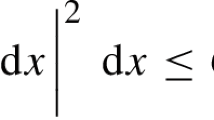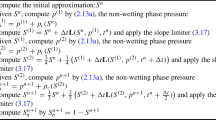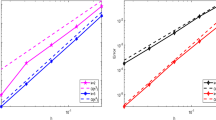Abstract
We consider the numerical approximation of acoustic wave propagation problems by mixed \(\text {BDM}_{k+1}\)–\(\text {P}_k\) finite elements on unstructured meshes. Optimal convergence of the discrete velocity and super-convergence of the pressure are established. Based on these results, we propose a post-processing strategy that allows us to construct an improved pressure approximation from the numerical solution. Corresponding results are well-known for mixed finite element approximations of elliptic problems and we extend these analyses here to the hyperbolic problem under consideration. We also consider the subsequent time discretization by the Crank–Nicolson method and show that the analysis and the post-processing strategy can be generalized to the fully discrete schemes. Our proofs do not rely on duality arguments or inverse inequalities and the results therefore also apply for non-convex domains and non-uniform meshes.
Similar content being viewed by others
References
Arnold, D., Brezzi, F.: Mixed and nonconforming finite element methods: implementation, postprocessing and error estimates. RAIRO Model. Math. Anal. Numer. 19, 7–32 (1985)
Baker, G.A.: Error estimates for finite element approximations for second order hyperbolic equations. SIAM J. Numer. Anal. 13, 564–576 (1976)
Baker, G.A., Bramble, J.H.: Semidiscrete and single step fully discrete approximations for second order hyperbolic equations. RAIRO Anal. Numer. 13, 75–100 (1979)
Bangerth, W., Rannacher, R.: Adaptive finite element techniques for the acoustic wave equation. J. Comput. Acoust. 1, 1–17 (1999)
Boffi, D., Brezzi, F., Demkowicz, L.F., Durán, R.G., Falk, R.S., Fortin, M.: Mixed Finite Elements, Compatibility Conditions, and Applications, Lecture Notes in Mathematics, vol. 1939. Springer, Fondazione C.I.M.E., Berlin, Florence (2008)
Boffi, D., Brezzi, F., Fortin, M.: Mixed finite element methods and applications. Springer Series in Computational Mathematics, vol. 44. Springer, Heidelberg (2013)
Brezzi, F., Douglas, J., Duràn, R., Fortin, M.: Mixed finite elements for second order elliptic problems in three variables. Numer. Math. 47, 237–250 (1987)
Brezzi, F., Douglas, J., Marini, L.D.: Two families of mixed elements for second order elliptic problems. Numer. Math. 88, 217–235 (1985)
Chen, Y.: Global superconvergence for a mixed finite element method for the wave equation. Syst. Sci. Math. Sci. 12, 159–165 (1999)
Chen, Y., Huan, Y.: The superconvergence of mixed finite element methods for nonlinear hyperbolic equations. Numer. Simul. 3, 155–158 (1998)
Chen, Z.: Superconvergence results for Galerkin methods for wave propagation in various porous media. Numer. Methods Partial Differ. Equ. 12, 99–122 (1999)
Cohen, G.: Higher-Order Numerical Methods for Transient Wave Equations. Springer, Heidelberg (2002)
Cohen, G., Joly, O., Roberts, J.E., Tordjman, N.: Higher order triangular finite elements with mass lumping for the wave equation. SIAM J. Numer. Anal. 38, 2047–2078 (2001)
Cowsar, L.C., Dupont, T.F., Wheeler, M.F.: A priori estimates for mixed finite element approximations of second-order hyperbolic equations with absorbing boundary conditions. SIAM J. Numer. Anal. 33, 492–504 (1996)
Douglas, J., Dupont, T., Wheeler, M.F.: A quasi-projection analysis of Galerkin methods for parabolic and hyperbolic equations. Math. Comput. 32, 345–362 (1978)
Dupont, T.: \(l^2\) estimates for Galerkin methods for second-order hyperbolic equations. SIAM J. Numer. Anal. 10, 880–889 (1973)
Evans, L.C.: Partial Differential Equations. Graduate Studies in Mathematics, vol. 19. American Mathematical Society, Providence (1998)
Geveci, T.: On the application of mixed finite element methods to the wave equations. RAIRO Model. Mathods Anal. Numer. 22, 243–250 (1988)
Jenkins, E.W., Rivière, T., Wheeler, M.F.: A priori error estimates for mixed finite element approximations of the acoustic wave equation. SIAM J. Numer. Anal. 40, 1698–1715 (2002)
Joly, P.: Variational methods for time-dependent wave propagation problems. In: Ainsworth, M., Davies, P., Duncan, D., Martin, P., Rynne, B. (eds.) Topics in Computational Wave Propagation, LNCSE, vol. 31, pp. 201–264. Springer, Berlin
Karaa, S.: Error estimates for finite element approximations of a viscous wave equation. Numer. Func. Anal. Optim. 32, 750–767 (2011)
Landau, L.D., Lifshitz, E.M.: Course of theoretical physics, vol. 6, 2nd edn. Pergamon Press, Oxford, 1987. Fluid mechanics, Translated from the third Russian edition by J. B. Sykes and W. H. Reid
Makridakis, C.G.: On mixed finite element methods for linear elastodynamics. Numer. Math. 61, 235–260 (1992)
Makridakis, C.G., Monk, P.: Time-discrete finite element schemes for Maxwell’s equations. RAIRO Model. Mathods Anal. Numer. 29, 171–197 (1995)
Monk, P.: Analysis of a finite element methods for Maxwell’s equations. SIAM J. Numer. Anal. 29, 714–729 (1992)
Pazy, A.: Semigroups of Linear Operators and Applications to Partial Differential Equations. Applied Mathematical Sciences, vol. 44. Springer, New York (1983)
Schöberl, J.: Commuting quasi-interpolation operators for mixed finite elements. Isc-01-10-math, Institute for Scientific Computing, Texas A&M University (2001)
Stenberg, R.: Postprocessing schemes for some mixed finite elements. RAIRO Model. Mathods Anal. Numer. 25, 151–167 (1991)
Wang, F., Chen, Y., Tang, Y.: Superconvergence of fully discrete splitting positive definite mixed FEM for hyperbolic equations. Numer. Methods Partial Differ. Equ. 30, 175–186 (2014)
Wang, X., Bathe, K.-J.: Displacement/pressure based mixed finite element formulations for acoustic fluid–structure interaction problems. Int. J. Numer. Methods Eng. 40, 2001–2017 (1997)
Acknowledgements
The authors are grateful for financial support by the German Research Foundation (DFG) via Grants IRTG 1529 and TRR 154 project C4, and by the “Excellence Initiative” of the German Federal and State Governments via the Graduate School of Computational Engineering GSC 233 at Technische Universität Darmstadt.
Author information
Authors and Affiliations
Corresponding author
Rights and permissions
About this article
Cite this article
Egger, H., Radu, B. Super-convergence and post-processing for mixed finite element approximations of the wave equation. Numer. Math. 140, 427–447 (2018). https://doi.org/10.1007/s00211-018-0966-2
Received:
Revised:
Published:
Issue Date:
DOI: https://doi.org/10.1007/s00211-018-0966-2




